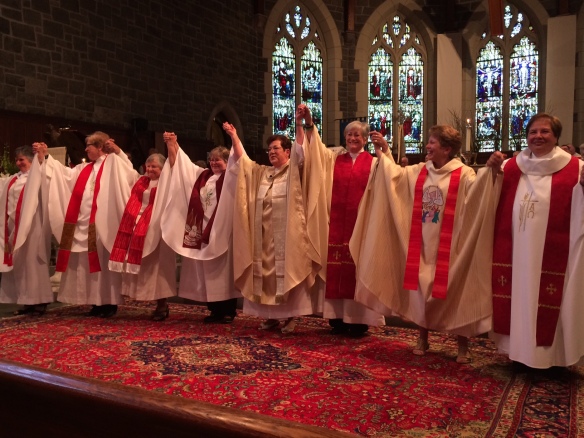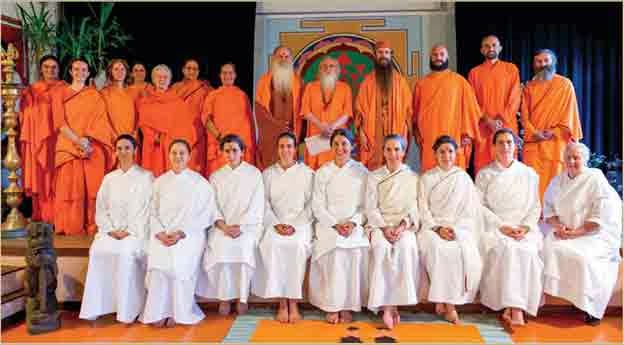
Defiant 'Constitutional' Bishops Ordain Women
September 4795

Eight women were ordained as priests by schismatic bishops
With the official excommunication of Aurorian clergy who took the oath to the Republic prescribed by the controversial "Constitution of the Clergy", the schism within the Selucian Church seems to have become permanent. Almost a third of all parish priests and a small number of bishops have sworn loyalty to Selucia, leading to their excommunication by Arch-Patriarch Benedictus X as well as heavy criticism from the Patriarch of Istalia, Solentia, and Quanzar. The schismatic bishops, led by the Archbishop of Victoria Aemilius Maxentius, have decided to formalize the schism by ordaining new priests and bishops to replace those who, under the provisions of the Constitution of the Clergy, have lost their positions, in collaboration with the Duodecimvirate who organized new democratic elections to replace the removed clergy. In a clear statement of defiance towards the conservative hierarchy of the Aurorian Patriarchal Church, eight of the newly ordained priests are women. This unprecedented and shocking act is probably a response to the secular and progressive movements, with a particularly strong presence in the Selucian population, which helped bring the Duodecimvirs to power, and is thus probably an attempt by the so-called "constitutional" clergy, i.e. those that took the oath to the Republic required by the Constitution of the Clergy, to forge their identity as a modern, progressive, and republican Church in full agreement with the values and virtues of the Selucian people.
Explaining the reasoning behind the schism and condemning statements from the Patriarch of Istalia and the Arch-Patriarch, Archbishop Maxentius appealed to Church tradition for precedent in the election of the clergy by the laity, transmitting this short official communique:
Where was Patriarch Gabriele when Order, Faith and Family imposed Church membership on the whole of Istalian population? Where was Arch-Patriarch Benedictus when Nova Harmonia forced Hosian values on Selucia and stigmatized the Pagans? It seems that the Church lately only cries "dictatorship" when its privileges are threatened. If they had bothered to look at the Sacred Tradition they would know that during the first centuries of the Church Bishops were not appointed by the Arch-Patriarch, they were elected by the Faithful themselves. Their authority comes not from the Arch-Patriarch, but from them having been ordained to the Episcopate. Even the Bishop of Auroria himself has often been elected by popular acclamation and not by a conclave. Patriarch Gabriele claims that the Supreme Watcher is elected only by the Will of God. But if the Will of God can speak through the College of Cardinals, then God can surely speak through the people, as He has done before. And now the Arch-Patriarch has excommunicated us, when our only sin was to swear loyalty to the democratic laws of the nation under whose rule we live. We swore loyalty to the Senate and People of Selucia, not to the Duodecimviri, and our civic oath is to serve the Republic in the interest of the common good, not to abandon or modify our faith as some have falsely accused us. Through their actions the non-jurors have shown themselves enemies of democracy and instigators of schism.
With the schism deepening, the military government has proceeded to replace non-juring clergy with new priests and bishops, democratically elected by their faithful. The replacement has not been uniform, and has so far only been carried over in places where Hosians constitute a minority. In most cases the majority of Aurorians refused to participate in the elections. In a few instances, the "constitutional" clergy were forcefully prevented from taking their office by their flocks, while in other, more secular municipalities the non-juring clergy were removed from office by the laity before the forces of the Duodecimvirate had arrived. Unevenly enforced, the Constitution of the Clergy has caused much chaos and triggered numerous protests, causing a sharp division among the Aurorian population of Selucia.
Gerajan Collegium Formed

Priests and priestesses of the Geraja Collegium
In a gesture of gratitude for the support that the Duodecimvirate and Religio Seluciana have received from the Malivian government and Gerajan faithful, the College of Pontiffs, the ruling body of the Selucian Religio, has authorized the formation of an autonomous collegium for the Gerajan faith within the Cultus Deorum. Reciprocating a three hundred year old gesture, the College of Pontiffs recognized Geraja as a well-established foreign cult within Selucia. Historically, many different polytheistic religions were practiced on Selucian territory, including the Religio, and while most of them had their gods reinterpreted as aspects of Selucian deities or were outright incorporated into the religion's pantheon, more firmly established foreign cults, particularly mystery cults, were granted their own autonomous leadership and the maintenance of their own foreign rites. This status has now been extended to Geraja, with the official establishment of a Collegium formed of priests and priestesses elected by the small Gerajan community in Selucia. Geraja will function as a religion separate and autonomous from Religio Seluciana, but it will be subject to Selucian laws and the decrees of the Religio's College of Pontiffs.
Regarding the Malivian government's offer of a union between the two nations, a spokesman of the Decemvirate declared that "while their power is absolute, it is temporary, and dedicated to nothing more and nothing less than the restoration of the Republic. Decisions of this caliber ought to be taken by the Senate and People of Selucia once democratic governance is restored, but the Duodecimviri have no a priori objections to future cooperation between the two peoples, up to full political union."





